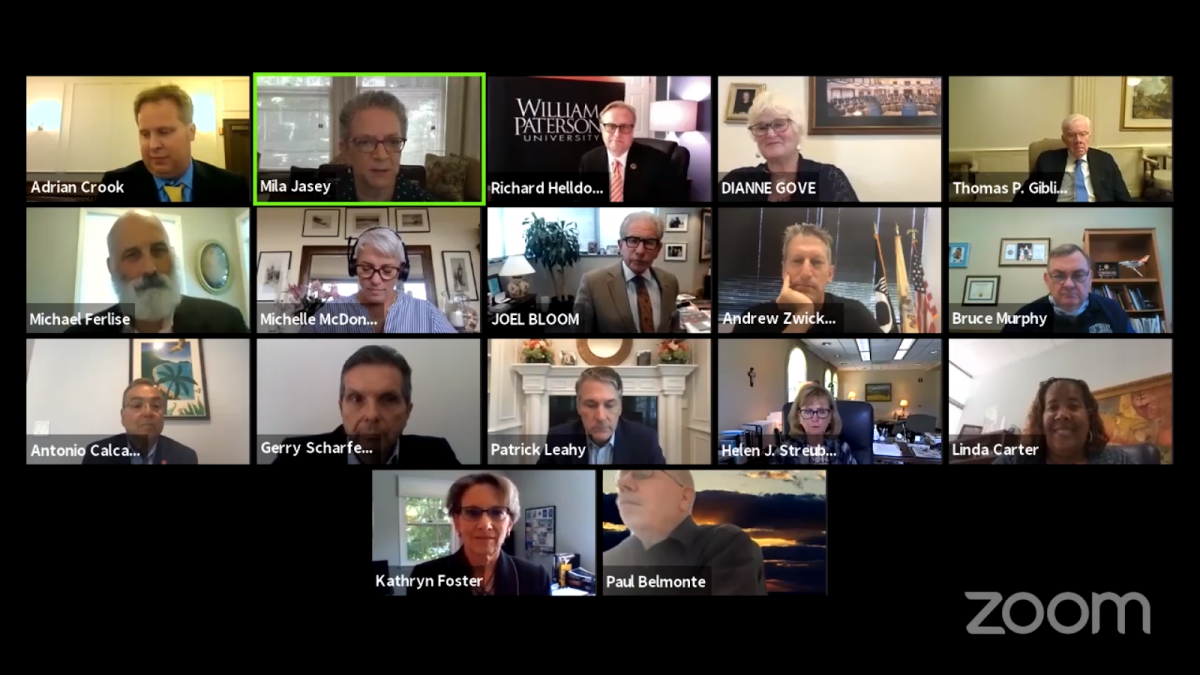Colleges and Universities Reopening Amidst Health Pandemic
By: Abel P. Morais Jr.
On Thursday, July 9th, the New Jersey Assembly Higher Education Committee met with representatives from public and private institutions of higher education from across New Jersey. This meeting allowed for each representative to inform and explain their reopening plans for the fall semester for their respective institutions to the Assembly and voice any concerns they have. Not all institutions of higher education testified at the committee meeting, but for those that did, they each had 3 to 4 minutes to explain briefly what their reopening plans were and how they were to work in accordance with new state policies.

Because of covid-19, The New Jersey Assembly Higher Education Committee meeting was held on zoom.
After listening to the committee hearing, I found that a lot of the new regulations are going to, if they haven’t already, have negative effects on students like me. To begin, there will be a big disadvantage to students who rely on on-campus housing. In order to adhere to social distancing guidelines, the dorms need to hold less capacity than they did before resulting in less density of students in the area, meaning that significantly fewer students will be able to live on campus.
I know a student who is going into their junior year, has been living on campus since freshman year, registered for dorms before the deadline date, but was now denied a room. Nothing in her life circumstances has changed from last year until now besides the effects of COVID-19. She isn’t the only person who faces this issue, she met a group of girls who also got denied a dorm for the Fall semester. This has led each person to need to figure out if they will have to find off-campus living or commuter far away to attend classes.
Many institutions have released plans already for the fall, but few, if any, have consulted their students when making these plans. Colleges and universities are looking at factors such as course content and class sizes when determining if the courses should be held fully online, in person, or a hybrid of the two. While the decisions made by leadership may work for some students, those who have other obligations in their personal life may find it difficult to continue their education efficiently. I know many students who used to go to school during the day time while their young children are at school. This worked quite well for the parents, they were able to be at school while their kind was being taken care of at their school.

A mother helping her child do school work
However, with the uncertainty of how public schools are going to work for the upcoming 2020-2021 school year, it puts these students with children in a hard situation. If the public schools decide to have online classes in any way, whether it be fully or a hybrid mix, then many parents will need to stay home with their children. What will cause an issue is if the parent has an in-person class and must be on campus during the day when their young child is at home doing an online class. Hopefully, institutions or individual faculty will see the issue and help accommodate these students.
Institutions of higher education need to understand the circumstances of their students. During a global health pandemic, it is more important than ever to listen to students for their safety. If students are in a financially difficult situation, they may need time to go to work, which could mean a new job or different times. Classes need to be prepared to be more flexible for students who can’t show up on campus for work reasons, home environment, or health concerns. If students are scared to return to campus, universities and colleges can not expect the students to do so.
If an institute of higher education is really looking out for their students, they would allow each student to have a more flexible schedule for this upcoming semester, as possible in the future. At the Higher Ed Committee hearing, President Richard J. Helldobler, of William Paterson University, shared his institution’s plan of how to balance in-person and online classes. For Freshman and Sophomores, classes will be held in person, for Juniors, it will be a week by week rotational period of in-person and online, and for Seniors, if will be depending on how the professor wishes to run each class. What this leads to is giving Seniors more flexibility than those who are Freshmen. While it may sound nice, it doesn’t take into consideration if the Freshman student may have younger children, have a high-risk family at home, or are at high risk themselves.

President of William Paterson University, Dr. Richard J. Helldobler speaking at the committee hearing
Our colleges and universities are infatuated with the idea of giving students the college experience like everyone else before them had. However, right now is a very different time going on in the world where students aren’t going to have the experience they thought they would or have the ones of those before them, but instead they will have a whole new experience. Rather than focusing on giving students the college life experience during the pandemic, higher education should focus more so on how to keep their students safe and healthy. If it comes at the expense of losing the college experience, then, in my opinion, it must be sacrificed.
About The Author: Abel P. Morais Jr. is a Lesniak Institute Intern and a Senior at Kean University studying political science.
Categories
More Stories
- Inspiring Change: A Step-By-Step Guide to A Campus Activism Event
- Advocacy Through Social Media: Extending Beyond Your Platform
- Unwrapping the Future: The Growth of Plastic Film Recycling
- My Visit To The State House in Trenton
- Lost Childhoods: Exposing the Triad of Illegal Immigration, Child exploitation, and Abuse
- The Realities of The Homeless Crisis
- WHO RUNS THE WORLD: Women Who Advocate for Diversity, Equity, and Inclusion

